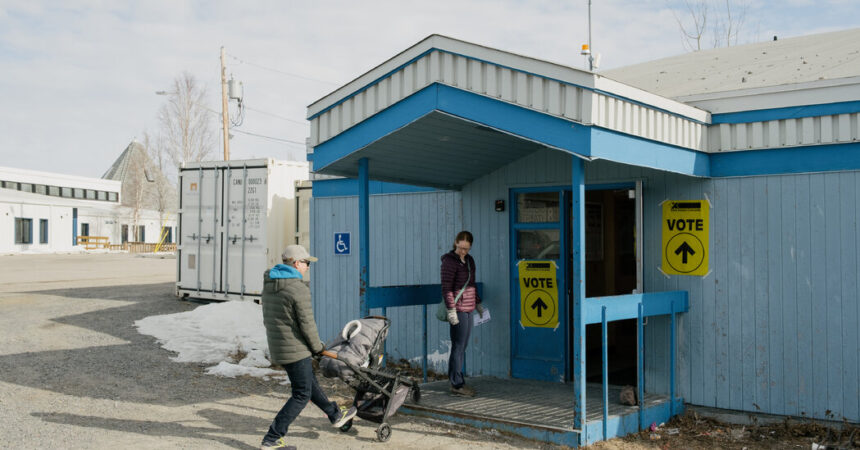A year of quick surveys results for the Liberal Party that has governed Canada for almost a decade was bad enough. But then the almost unthinkable came: a defeat in a special election in the center of Toronto, the electoral strength for a long time of the parties.
Last year’s defeat, many analysts believe, triggered the chain of events that led to the resignation of Justin Trudeau as prime minister and the federal elections that will be heroes on Monday.
Voters in Toronto had been vital to keep Mr. Trudeau and liberals in power through three elections. Then, the loss of a district of Toronto, hero for a prominent liberal for 28 years, before the conservatives was an impressive blow and an omen of worst to come in a general election.
Now, with the 343 seats in the House of Commons that will be filled in the general elections, the 56 at stake in the area of the Great Toronto releases the only one will probably determine who directs Canada through a commercial battle with the United States.
The conservatives had been making raids in the crucial area of Toronto, with approximately 7 million people, before President Trump turned the electoral panorama by imposing tariffs on Canada.
The two main contestants to become the next leader of the country are Prime Minister Mark Carney of the Liberals and Pierre Poilievre of the conservatives.
These voters who could go in any direction
While the two seats of boxes in Toronto have not been a fertile terrain for conservatives, despite the result of special elections, voters in the 32 districts of rapidly growing communities that surround the city not particularly attached to any of the parties and are slow for Gabs.
“I would like to say that ideological are too conservative,” said David Coletto, ABACUS data leader, a voting firm. “But that leftist center or leftist activist or the leftist core that we see in the center of urban centers, which does not exist.”
In the past, said Coetto, many voters outside Toronto helped liberals win federal elections, but would vote for candidates for conservative parties in the provincial votes of Ontario.
Surfaceing the importance of the region for the general result, Mr. Carney is expected to spend much of the last weekend of the campaign in the Metropolitan Area of Toronto.
Appealing to immigrant voters is important
Many ethnic communities, including some with a large number of recent immigrants, dominate some of the communities that surround Toronto, from South and Italian Asians to the northwest of the city, to Chinese and other Asian communities northeast.
While immigrants cannot vote until citizens obtain, all the main political parties have long concentrated to attribute to their communities.
A federal work group on intelligence and security threats for elections has said that India, China, Pakistan and Iran are probably pointing to those communities with misinformation campaigns related to the elections.
This week he said that he had discovered that China is trying to speak to the speech Canadians of Turrent against a conservative candidate of the Toronto area who is critical of the limits of democracy in Hong Kong.
Dennis Pilon, a political scientist from the University of York in Toronto, said that some leaders of these ethnic groups may be important political influence.
The cost of living and housing prices are concerns
The cost of living is a superior group for voters in communities outside Toronto, said Coletto, adding that many residents live in those Ares largely because they cannot pay houses in the city or in the nearby suburbs.
Housing prices in Toronto have increased by 44 percent since 2020.
Until the beginning of this year, that worked in favor of Mr. Poilievre, who regularly blamed Mr. Trudeau for inflation and the increase in housing prices.
And many voters, said Professor Pilon, had simply tired of the liberals after a decade of power and the feeling that the country was directed directly to evil.
Both parties have promised to help Canadians with financial problems providing tax exemptions for some housing buyers.
Trump’s rates, a new leader, brings a reversal
Mr. Coletto said his survey shows that the liberal now leads for 15 percentage points in Toronto and for eight percentage points in the largest area of the Great Toronto.
Liberals have gained strength in recent weeks, while conservatives and some smaller parties have lost ground, and a significant factor has been Trump’s economic attacks against Canada and his talk about annexing the country.
Surveys have constantly demonstrated that Canadians believe that Mr. Carney, a former central banker with experience that deals with adjusted financial crises, can do a better job than Mr. Poilievre when dealing with Mr. Trump.
American tariffs, even in vehicles and auto parts, can have a disproportionate effect in the Metropolitan area of Toronto, which houses many manufacturers of car parts, as well as vehicle assembly plants or Motors and Stellantis, owner of Chrysler.
The tariffs that Mr. Trump has applied to his neighbor can play a key role in determining who will capture this deep well or Canadian voters, analysts said.
To win a national election without having a good performance in the Great Toronto, “you need to win everything except,” said Coletto. “That is impossible in a country is diverse and different as Canada.”








